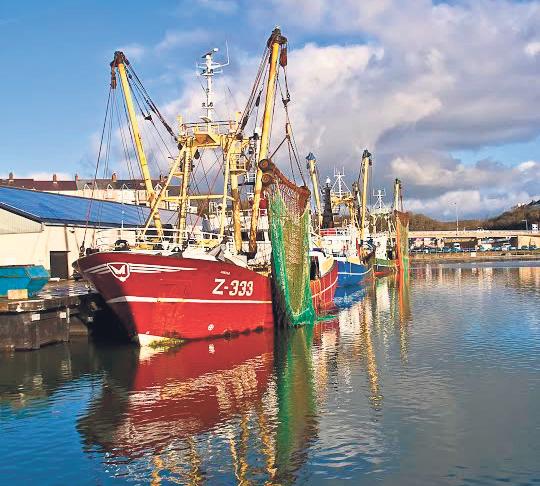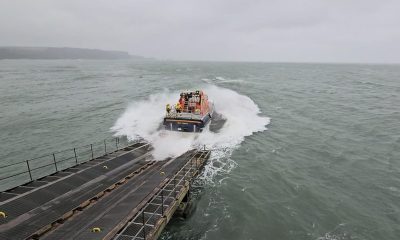News
New €7m EU investment in Wales and Ireland’s fisheries industry


Fishing boat: In Milford Haven
MORE than €7m of EU funds will be invested in science and technology projects to help protect and develop the marine life and the fisheries industry in Wales and Ireland.
The funding will support a scientific investigation of the opportunities and risks posed by climate change in the Irish Sea and the deployment of technology to reduce energy costs and help businesses develop new products and processes.
Both projects are being funded through the EU’s Ireland-Wales co-operation programme, which is helping to strengthen economic links and cross-border collaboration between the two countries.
Welsh Government Finance Secretary, Mark Drakeford, said: “These projects bring together expertise from both nations to support an industry in Wales and Ireland that shares the same opportunities, challenges and resources within the Irish Sea.
“Collaborative schemes like these are why we are clear about the advantages to Wales of ongoing access to territorial co-operation programmes, including the Ireland-Wales programme, when the UK leaves the EU.”
Irish Minister for Public Expenditure and Reform, Paschal Donohoe, T.D. said: “I am delighted to see the launch of another two projects under the Ireland-Wales programme.
“This is a clear demonstration of our continuing commitment to the programme. It also underlines the importance of EU funding for scientific research into areas of shared interest.”
Around €5.5m of EU funds will support the Bluefish marine science partnership, which will investigate the effects of climate change in the Irish Sea on the sustainability of fish and shellfish.
Led by Bangor University, in partnership with Irish and Welsh organisations, the project will assess how climate change is affecting the health of fish stocks, the migratory movement of commercial fish, and risks from new non-native species.
The project will develop solutions to help fisheries businesses adapt to environmental changes in the Irish Sea and capitalise on new commercial opportunities.
Dr Shelagh Malham, senior research fellow at Bangor University’s School of Ocean Sciences, said: “We need to maintain a sustainable food supply chain.
“The combination of research between academic partners and collaboration with industry partners will ensure these vital industries receive the information and support they need to be more resilient to the changes the industry is facing and will continue to face in coming years, and to react to opportunities.”
A further €1.8m of EU funds will support the piSCES project, which will develop and test a new ‘smart grid’ electricity network to help reduce energy costs for the fisheries industry in Ireland and Wales.
The Telecommunications Software and Systems Group (TSSG) at Waterford Institute of Technology will research and design new energy networks in collaboration with Cardiff University, while Milford Haven Port Authority and Ireland’s seafood development agency, Bord Iascaigh Mhara (BIM), will work with businesses in the fish processing sector to provide live data and test sites.
piSCES aims to help fisheries businesses in remote locations minimise their exposure to energy price peaks, reduce their carbon footprint and improve the quality and security of energy supply.
Sean Lyons, project manager at TSSG, said: “TSSG is delighted to have secured EU funding through the Ireland-Wales programme for the piSCES project, which will see us further develop smart grid technologies and implement them in energy-intensive operations in the fish processing industry.
“Collaborating cross border with our partners will bring together a wealth of experience from an R&D and implementation perspective and expose the technology to different regulatory environments bringing significant benefits to the industry.”
News
Vote.wales: Information website launched to give people voting confidence

Vote.wales to host all essential election information for the Senedd election
A BRAND new voter information website, vote.wales, has been launched today (2 March) by the Electoral Management Board for Wales, part of the Democracy and Boundary Commission Cymru.
Vote.wales is the first website of its kind in Wales and tells people everything they need to know about the election, including advice about voting, information about the Senedd, and a postcode search function to provide tailored local information.
The website holds information about who can register to vote, how voting works in polling stations, as well as postal and proxy voting, and what accessibility support people can expect when they go to vote.
A postcode search function on vote.wales allows voters to see which of Wales’ 16 new constituencies they will be voting in, as well as telling them where their local polling station is located.
Once nominations have closed, the website will also inform voters which political parties and independent candidates are standing in their area.
The website explains how the Senedd works and what it does, highlighting which policy areas are devolved to the Senedd and which remain the responsibility of the UK Parliament. It also sets out the difference between the Senedd and the Welsh Government.
Further developments are expected in the coming weeks. In a first for Welsh elections, voters will soon be able to access detailed accessibility information about their local polling station. Political parties and independent candidates will also be able to publish their election leaflets on the platform, so voters can see not only who is standing but what they stand for.
Following the election, vote.wales will publish the full election results.
Commenting on the launch, Shereen Williams MBE OStJ, Chief Executive of the Democracy and Boundary Commission Cymru, said:
“An important election is coming on 7 May, and vote.wales is the place to go to find out all about it.
“We know that people across Wales are looking forward to making their voices heard at this election, but many people don’t feel they have all the information they need before they go and vote.
“If you have questions about this election, then head to vote.wales. Voting confidence starts here.”
Crime
Pencoed: Assault victim dies and murder investigation launched

THE POLICE investigation into the serious incident which happened on Felindre Road, Pencoed, in the early hours of Saturday, February 28, is now being treated as murder.
We can confirm the 58-year-old man who was critical in hospital passed away earlier today – his family are being supported by specially trained officers at this time, and our thoughts are with them.
The Major Crime Investigation Team at South Wales Police is now leading the investigation, and the 26-year-old man arrested remains in police custody.
Detectives investigating the incident are appealing to anyone who may have been in the vicinity of Felindre Road, Pencoed, between midnight and 5am on Saturday to get in touch.
Motorists are urged to their check dashcams for any footage which may be relevant.
Detectives would like to speak to two potential witnesses – two elderly people who are believed to have walked along Felindre Road between 12.30am and 4am on Saturday.
Detective Inspector Graham Williams, from the Major Crime Investigation Team, said: “Sadly, a 58-year-old man has died in hospital following the incident on Saturday morning. Our thoughts are with his family at this time and they are being supported. I would like to reassure the local community that we have somebody in custody and are not looking for anybody else at this time. I thank everyone in the community who has helped our investigation so far, and I urge anyone with information which may be relevant to our investigation – particularly the two potential witnesses – to get in touch.”
If anybody does have information, they should contact 101 quoting reference 2600063517. Alternatively, they can submit information via the Major Incident Public – https://mipp.police.uk/operation/62SWP26C30-PO1
Crime
School lockdown lifted after telephone threat as police continue enquiries

PUPILS and staff at Maesydderwen Comprehensive School in Ystradgynlais were released safely on Monday afternoon (Mar 2) after a lockdown was implemented following a reported telephone threat.
Dyfed-Powys Police confirmed officers were called to the school earlier in the day and worked with staff to ensure the safety of everyone on site. As a precaution, the school activated its lockdown procedure while enquiries were carried out.
Police said there were no reports of injuries and that all pupils and staff were safe and secure throughout the incident.
Officers remain at the scene while “diligent enquiries” into the threat continue. At this stage, no arrests have been made, and police have confirmed there is no evidence of any ongoing risk to pupils or staff.
Reassurance patrols will take place in the coming days to support pupils, staff, parents and the wider community.
Parents and guardians will continue to receive updates directly through the school messaging app, including confirmation on whether the school will open as normal on Tuesday.
Maesydderwen Comprehensive School is located in Ystradgynlais, Powys, and is served by Dyfed-Powys Police.
-

 News7 days ago
News7 days agoLabour and Plaid criticised over £1.2m anti-racism ‘metaverse’ project
-

 Health6 days ago
Health6 days agoHealth services row escalates as MSs demand action over Withybush and Bronglais
-

 Politics7 days ago
Politics7 days agoFarage vows to strip Cardiff’s ‘City of Sanctuary’ status ahead of manifesto launch
-

 Business6 days ago
Business6 days agoCouncil reviewing complaints over Computer Solutions Wales as concerns continue
-

 Health5 days ago
Health5 days agoPetition calling for Withybush intervention nears 5,000 signatures
-

 News7 days ago
News7 days agoPlaid Cymru drug decriminalisation policy under spotlight ahead of Senedd election
-

 Crime6 days ago
Crime6 days agoMilford Haven pensioner admits sexually assaulting two shop workers
-

 News5 days ago
News5 days agoWelsh Government criticised after Russian-linked drone image used in defence announcement


























